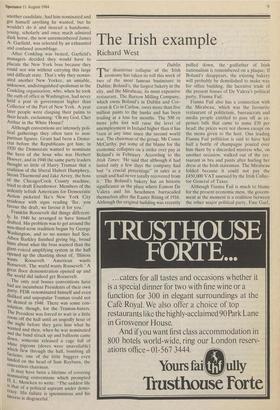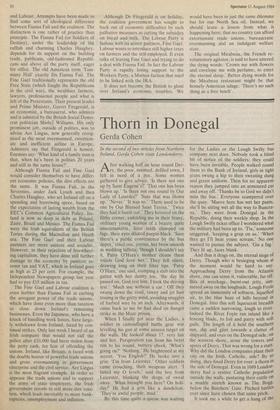The Irish example
Richard West
Dublin The disastrous collapse of the Irish economy has taken its toll this week of two of the most famous businesses in Dublin: Boland's, the largest bakery in the city, and the Mirabeau, its most expensive restaurant. The Barrow Milling Company, which owns Boland's in Dublin and Cor- coran & Co in Carlow, owes more than five million punts to the banks and has been trading at a loss for months. The 500 or more jobs lost will raise the level of unemployment in Ireland higher than it has been at any time since the second world war. The chairman of the group, Mr Conor McCarthy, put some of the blame for the economic collapses on a strike over pay at Boland's in February. According to the Irish Times: 'He said that although it had lasted only a few days the company had lost "a crucial percentage" in sales as a result and had never totally recovered from it.' The Boland's bakery has an historic significance as the place where Eamon De Valera and his henchmen barracaded themselves after the Easter Rising of 1916. Although the original building was recently
pulled down, the • godfather of Irish nationalism is remembered on a plaque. If Boland's disappears, the existing bakery will probably be demolished to make way for office building, the lucrative trade of the present bosses of De Valera's political party, Fianna Fail.
Fianna Fail also has a connection with the Mirabeau, which was the favourite restaurant of politicians, bureaucrats and media people entitled to pass off as ex- penses bills that came to some £50 per head: the prices were not shown except on the menu given to the host. One leading Fianna Fail politician is said to have had half a bottle of champagne poured over him there by a discarded mistress who, on another occasion, walked out of the res- taurant in bra and pants after hurling her dress at the Irish statesman. The Mirabeau folded because it could not pay the £450,000 VAT assessed by the Irish Collec- tor General of Taxes.
Although Fianna Fail is much to blame for the present economic mess, the govern- ment at the moment is a coalition between the other major political party, Fine Gael, and Labour. Attempts have been made to find some sort of ideological difference between Fianna Fail and the coalition. The distinction is one rather of practice than principle. The Fianna Fail (or Soldiers of Destiny), under the leadership of the raffish and charming Charles Haughey, depends for its support on the building trade, publicans, old-fashioned Republi- cans and above all the party itself, eager for office. The old American term 'Tam- many Hall' exactly fits Fianna Fail. The Fine Gael traditionally represents the old Free State (which fought the Republicans in the civil war), the wealthier farmers, lawyers, professional people and what is left of the Protestants. Their present leader and Prime Minister, Garret Fitzgerald, is an economist, a bureaucrat, who admires and is admired by the British Social Demo- crat politician Shirley Williams. His only prominent job, outside of politics, was to advise Aer Lingus, now generally recog- nised as the most overmanned, extortion- ate and inefficient airline in Europe. Admirers say that Fitzgerald is honest. Enemies say: 'What kind of a family man is that, when he's been in politics 20 years and still in the same house?'
Although Fianna Fail and Fine Gael would consider themselves to have differ- ent economic policies, the dire effects are the same. It was Fianna Fail, in the Seventies, under Jack Lynch and then Charles Haughey, who set Ireland off on a spending and borrowing spree, based on the expectation of lasting wealth from the EEC's Common Agricultural Policy. Ire- land is now as deep in debt as Poland, Zaire, Brazil and Mexico. The Fianna Fail were the Irish equivalents of the British Tories during the Macmillan and Heath era. The Fine Gael and their Labour partners are more austere and socialist. However, in their rejection of freewheel- ing capitalism, they have done still further damage to the economy by punitive in- come tax and VAT, which in Ireland goes as high as 23 per cent. For example, the Independent Newspapers group last year had to pay £15 million in tax.
The Fine Gael and Labour coalition is even feebler than Fianna Fail at curbing the arrogant power of the trade unions, which have done even more than taxation to close down Ireland's remaining businesses. Even the Japanese, who have a knack of handling work forces, have large- ly withdrawn from Ireland, faced by con- tinual strikes. Only last week I heard of an Irish company that would not call the police after £10,000 had been stolen from the petty cash, for fear of offending the unions. Ireland, like Britain, is faced with the double horror of powerful trade unions and gross overmanning in government enterprise and the civil service. Aer Lingus is the most flagrant example. In order to appease the trade unions and to support the army of state employees, the Irish government resorts to still more dire taxa- tion, which leads inevitably to more bank- ruptcies, unemployment and inflation. Although Dr Fitzgerald is on holiday, the coalition government has sought to back out of economic difficulties by such palliative measures as cutting the subsidies on bread and milk. The Labour Party is furious with its seinor partners, Fine Gael. Labour wants to introduce still higher taxes on farmers and the self-employed. It even talks of leaving Fine Gael and trying to do a deal with Fianna Fail. In fact the Labour Party is rapidly losing support to the Workers Party, a Marxist faction that used to be linked with the IRA.
It does not become the British to gloat over Ireland's economic troubles. We would have been in just the same dilemma but for our North Sea oil. Instead, we should learn a lesson from what is happening here: that no country can afford extortionate trade unions, bureaucratic overmanning and an indulgent welfare state.
The original Mirabeau, the French re- volutionary agitator, is said to have uttered the dying words: 'Crown me with flowers and envelope me with perfume, to enter the eternal sleep.' Better dying words for the Mirabeau restaurant might be that homely American adage: 'There's no such thing as a free lunch'.







































 Previous page
Previous page